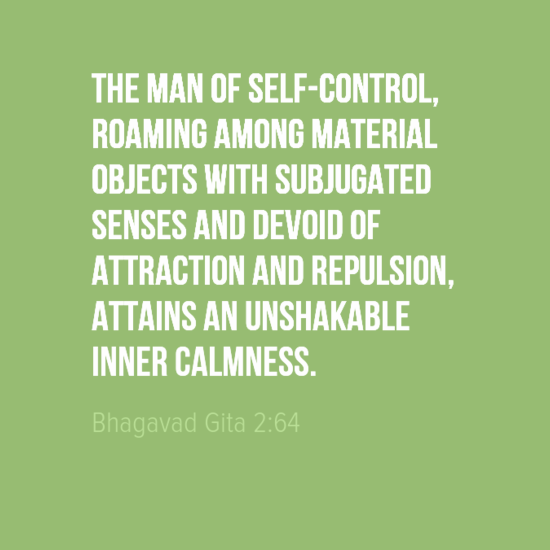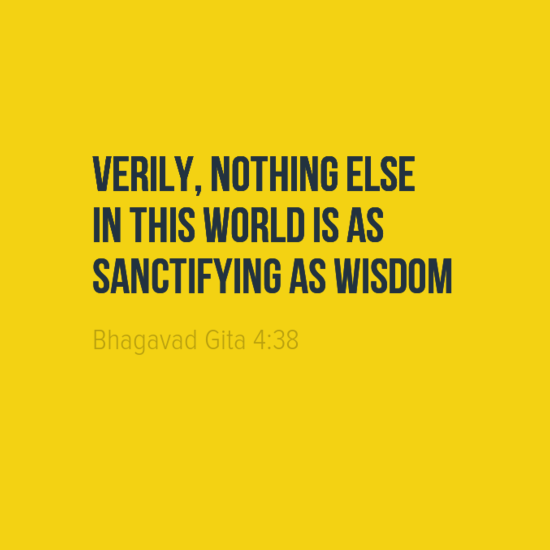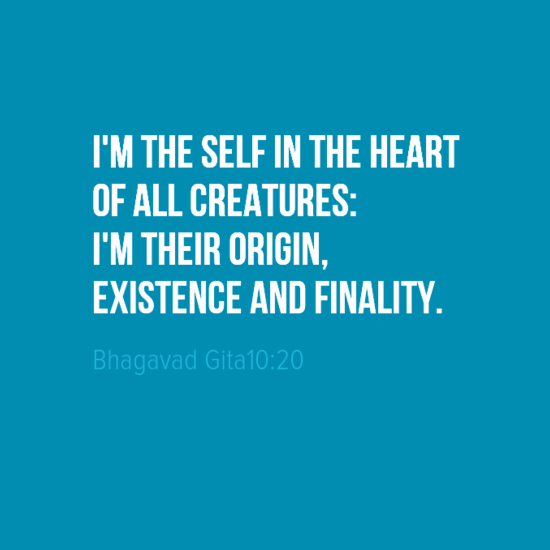Bhagavad Gita Quotes(English): On Karma, Dharma,Life,Spirituality

Bhagavad Gita Quotes- Wisdom:
-
The truly wise mourn neither for those who are living, nor for those who have passed away- Bhagavad Gita 2:11
-
Equalizing (by even mindedness) happiness and sorrow, profit & Loss, triumph & failure- so you encounter the battle, thus you will not acquire sin. - Bhagavad Gita 2:38
-
When a man completely relinquishes all desires of mind and is entirely contended in the self, by the self, he is then considered to be one settled in wisdom.- Bhagavad Gita 2:55
-
He who is everywhere non attached, neither joyously excited by encountering good nor disturbed by evil, has an established wisdom. -Bhagavad Gita 2:57
-
He is full with contentment, who absorbs all desires within, as the brimful ocean remains unmoved(unchanged) by waters entering into it-not he who lusts after desires. -Bhagavad Gita 2:70
-
Verily, nothing else in this world is as sanctifying as wisdom. In due course of time, the devotee who is successful in Yoga will spontaneously realize this within his self. -Bhagavad Gita 4:38
-
The man of devotion who is engrossed in the infinite, who has controlled the senses achieves wisdom. Having obtained wisdom, he immediately attains supreme peace -Bhagavad Gita 4:39
-
Self-realized sages behold with equal eye a learned and humble Brahmin, A cow, an elephant, a dog and one who eats dog.-Bhagavad Gita 5:18
-
That Yogi who is gladly absorbed in truth and self realization is said to be indissolubly united to spirit. Unchangeable, conqueror of senses, he looks with an equal eye an earth, stone and gold.-Bhagavad Gita 6:8
-
Without craving for honour, free from delusion and malignant attachment, all longings banished, disengaged from the pair of opposites- pleasure and pain- ever established in the self, the undeceived attain the immutable state.-Bhagavad Gita 15:5
-
Lust, anger, and greed-these constitute the threefold gate of hell, leading to the destruction of the soul's welfare. These three, therefore, man should abandon.-Bhagavad Gita 16:21
-
Meditative communion with one's own true self, and uttering words that cause no agitation and that are truthful, pleasant, and beneficial, are called the austerity of the speech-Bhagavad Gita 17:15
Bhagavad Gita Quotes- Duality/ Delusion/ Maya:
-
The ideas of heat and cold, pleasure and pain are produced by the contact of the senses with their objects, such ideas are limited by a beginning and an end, they are transitory, bear them with patience. - Bhagavad Gita 2:14
-
Of the unreal, there is no existence. Of the real there is non-existence. The final truth of both of these is known by men of wisdom. -Bhagavad Gita 2:16
-
Attachment and repulsion of the senses for their specific objects are nature-ordained. Beware the influence of this duality. Verily, these two (psychological qualities) are human's enemies -Bhagavad Gita 3:34
-
He is to be known as a constant sanyasi (renunciant), easily liberated from all entanglements, who has neither likes nor dislikes because he is unbound by the dualities(nature's pairs of opposites) -Bhagavad Gita 5:3
-
The Lord is lodged in the hearts of all creatures, and by his cosmic delusion(Maya) compels all beings to rotate as if attached to a machine.-Bhagavad Gita 18:61
Bhagavad Gita Quotes- Self Control/ sense objects:
-
He who can not be ruffled by contacts of the senses with their objects, who is calm and even minded during pain and pleasure, he alone is fit to attain everlastingness. - Bhagavad Gita 2:15
-
The man who physically fasts from the sense objects finds that the sense objects fall away for a little while, living behind only the longing for them. But he who beholds the supreme is freed even from longings - Bhagavad Gita 2:59
-
Eager excitable senses do forcibly seize the consciousness even of one who has a high degree of enlightment, and is striving(for liberation) - Bhagavad Gita 2:60
-
He who unites his spirit to Me having subjugated all his senses, remains concentrated in Me, as the supremely desirable. The intuitive wisdom of that yogi becomes steadfast whose senses are under his sway - Bhagavad Gita 2:61
-
The man of self-control, roaming among material objects with subjugated senses and devoid of attraction and repulsion, attains an unshakable inner calmness. - Bhagavad Gita 2:64
-
As a boat on the water is carried off course by a gale. So an individual's discrimination is driven from its intended path when the mind succumbs to the wandering senses. - Bhagavad Gita 2:67
-
His wisdom is well-established, whose sense faculties are wholly subjugated in regards to sense objects- Bhagavad Gita 2:68
-
The individual who forcibly controls the organs of action, but whose mind rotates around thoughts of sense objects, is said to be a hypocrite, deluding himself- Bhagavad Gita 3:6
-
But that man succeeds supremely, he who disciplining the senses by the mind, unattached, keeps his organs of activity steadfast on the path of God-uniting actions.- Bhagavad Gita 3:7
-
Because sense pleasures spring from outward contacts, and have beginning and end (are ephemeral), they are begetters only of misery. No sages seeks happiness from them- Bhagavad Gita 5:22
-
For him whose self(ego) has been conquered by the self(soul), the self is the friend of the self; but verily the self behaves inimically, as an enemy, toward the self that is not subdued.- Bhagavad Gita 6:6
Bhagavad Gita Quotes- Nature of God/Self/Reality:
-
Regarded as having a termination of existence are these fleshly garments(bodies); immutable, imperishable and limitless is the indwelling self. -Bhagavad Gita 2:18
-
Know as imperishable the one by whom everything has been manifested and pervaded. No one has power to bring about the annihilation of this unchangeable spirit. -Bhagavad Gita 2:16
-
He who considers the self as the slayer; he who deems that it can be slain: neither of these knows the truth. The self does not kill, nor is it killed. -Bhagavad Gita 2:19
-
This self is never born, nor does it ever perish; nor having come into existence will it again cease to be. It is birthless, eternal, changeless, ever same (unaffected by the usual process associated with time). It is not slain when the body is killed. -Bhagavad Gita 2:20
-
How can he who knows the self to be imperishable, everlastingly permanent, birthless and changeless, possibly think that the self can cause the destruction of another? -Bhagavad Gita 2:21
-
Just as an individual forsaking torn clothes dons new clothes, so the body enseized soul relinquishing decayed bodily habitations enters others that are new. -Bhagavad Gita 2:22
-
No weapon can pierce the soul, no fire can burn it; no water can moisten it; nor can any wind wither it. -Bhagavad Gita 2:23
-
The soul is uncleavable; it can not be burnt or wetted or dried. The soul is immutable all-permeating, ever calm and immovable-eternally the same. -Bhagavad Gita 2:24
-
The soul is said to be imponderable, unmanifested and un-changeable. Therefore knowing it to be such, you should not lament. -Bhagavad Gita 2:25
-
If you imagine the soul incessantly to be born and to die, even in that case, you should not grieve for it. For that which is born must die and that which is dead must be born again, why then should one grieve about the unavoidable? -Bhagavad Gita 2:26-27
-
No compelling duty have I(Perfected Soul) to perform; there is naught I have not acquired, nothing in the three worlds remains for me to gain! Yet I'm consciously present in the performance of all actions. -Bhagavad Gita 3:22
-
Cognizing the self as superior to the intelligence, and disciplining the self(ego) by the self(soul), annihilate the foe! Hard-to-conquer, wearing the form of desire. -Bhagavad Gita 3:43
-
In whatever way people are devoted to me, in that measure I manifest Myself to them. All men, in every manner(of seeking Me), pursue a path to Me -Bhagavad Gita 4:11
-
The all-pervading take no account of anyone's virtues or sin. Wisdom is eclipsed by cosmic delusion; mankind is there by bewildered-Bhagavad Gita 5:15
-
I'm the fluidity in waters; I'm the radiation in the moon and the sun; I'm the AUM(Pranava) in all the Vedas; the sound in the Ether; and the manliness in men -Bhagavad Gita 7:8
-
Know me to be the eternal seed of all creatures, I'm the understanding of the keen, the radiance of vital beings. -Bhagavad Gita 7:10
-
Among the powerful I'm the power that is free from longing and attachment, I'm that desire in men which is in keeping with dharma(righteousness)-Bhagavad Gita 7:11
-
Whatever embodiment (a god incarnate , a saint, or a deity) a devotee strives faithfully to worship, it is I who make his devotion unflinching. -Bhagavad Gita 7:21
-
The indestructible and supreme spirit is Brahman. It is undifferentiated manifestation(as Kuthasta chaitanya, as individual soul) is called Adhyatma. The AUM(cosmic Vibration or the Visarga) the cause the birth and sustenance and dissolution of beings and their various natures is termed Karma (cosmic Actions)-Bhagavad Gita 8:3
-
Discrimination, Wisdom, Lack of Delusion, forgiveness, truth, control of the senses, peace of mind, Joy, sorrow, birth, death, fear, courage, harmlessness, equanimity, serenity, self-discipline, charity, fame and infamy- these diverse states of being spring from Me alone as modification of My nature. -Bhagavad Gita10:4-5
-
I'm the source of everything; from Me all creation emerges. With this realization the wise, awestricken, adore Me.-Bhagavad Gita10:8
-
I'm the self in the heart of all creatures: I'm their origin, existence and finality.-Bhagavad Gita10:20
-
I'm all dissolving death; I'm birth, the origin of all that will be; among feminine manifestations(qualities of prakriti), I'm fame, success, the illumining power of speech, memory, discriminative intelligence, the grasping faculty of intuition, and the steadfastness of divine forbearance-Bhagavad Gita 10:34
-
I'm the gambling of the practisers of fraud; I'm the radiance of the radiant; I'm the victory and the striving power; I'm the quality of Sattva among the Good.-Bhagavad Gita 10:36
-
I'm the Rod of the discipliners, I'm the art of those who seek victory; I'm also the silence of all Hidden things, and the wisdom of all knowers; -Bhagavad Gita 10:38
-
I'm, further more whatsoever constitutes the reproductive seed of all beings. There is nothing, moving or motionless, that can abide without Me.-Bhagavad Gita 10:39
Bhagavad Gita Quotes- Worship:
-
Whatever embodiment (a god incarnate , a saint, or a deity) a devotee strives faithfully to worship, it is I who make his devotion unflinching. -Bhagavad Gita 7:21
-
Even devotees of other Gods, who sacrifice to them with faith, worship Me alone, though not in the right way. -Bhagavad Gita 9:23
-
I'm indeed the only enjoyer & Lord of all sacrifices. But they(the worshipper of My lesser forms) do not perceive Me in My true nature; hence they fall-Bhagavad Gita 9:24
Bhagavad Gita Quotes- Reincarnation:
-
As in the body, the embodied self passes through childhood, youth, and old age, so is its passage into another body; the wise are not disturbed.-Bhagavad Gita 2:13
-
In this path (of Yoga action) there is no loss of unfinished efforts for realization, nor is there creation of contrary effects. Even a tiny bit of this real religion protects one from great fear (the colossal suffering inherent in the repeated cycles of birth and death) -Bhagavad Gita 2:40
-
Those who have mastered their minds become engrossed in infinite wisdom; they have no further interest in any fruits of actions. Free thus from the chain of rebirth, they attain the state beyond sorrow. -Bhagavad Gita 2:51
-
A fallen Yogi gaining entry to the world of the virtuous, remains there for many years; afterward he is reborn on earth in a Good and prosperous home. Or he may reincarnate in a family of enlightened Yogis, verily a birth like that is much harder to gain on this earth, there he recovers Yoga discrimination attained in his former existence and tries more strenuously for spiritual success. The power of former yoga practice is sufficient to force, as it were the Yogi on his onward path. an eager student of even theoretical Yoga is farther advanced than a follower of outward spiritual rites.-Bhagavad Gita 6:41-44
-
After many incarnations, the sage attains Me, realizing, "the Lord is all-pervading!", A man so illumined is hard to find.-Bhagavad Gita 7:19
-
Yogis not yet free from the world revolve back again(to the world) even from the high sphere of Brahma(union with God in samadhi) but on entering into Me(the transcendental spirit) there is no rebirth.-Bhagavad Gita 8:16
Bhagavad Gita Quotes- Death:
-
The one who dwells in the bodies of all is eternally inviolable. Grieve not, therefore, for unavoidable death of any created being. -Bhagavad Gita 2:30
-
This is the "established in Brahman" state. Anyone entering this state is never (again) deluded. Even at the very moment of transition (from the physical to the astral), if one becomes anchored there in, he attains the final, irrevocable state of spirit-communion.-Bhagavad Gita 2:72
Bhagavad Gita Quotes- Yoga/ Yogi:
-
In this path (of Yoga action) there is no loss of unfinished efforts for realization, nor is there creation of contrary effects. Even a tiny bit of this real religion protects one from great fear (the colossal suffering inherent in the repeated cycles of birth and death) -Bhagavad Gita 2:40
-
In this Yoga, the inner determination is single, one-pointed; where as the reasoning of the undecided mind are un-ending and variously ramified. -Bhagavad Gita 2:41
-
When the yogi, like a tortoise withdrawing its limbs, can fully retire his senses from the objects of perception, his wisdom manifests steadiness. -Bhagavad Gita 2:58
-
One who is united to Cosmic wisdom goes beyond the effect of both virtue and Vice, even here in this life. Therefore, devote thyself to Yoga, divine union. Yoga is art of proper action -Bhagavad Gita 2:50
-
No single-pointed resolution (no fixity of mind) in the meditative state of Samadhi grows in those who cling tenaciously to power and sense delights, and whose discriminative intelligence is led astray by the flowery declamation of spiritually ignorant. contending that there is not else than to rejoice in the laudatory aphorism of the vedas, their true nature being afflicted with earthly inclinations, having heaven (the pleasurable phenomenon of the astral world) as their highest goal, performing the numerous specific sacrificial rites for the purpose of obtaining, enjoyment and power-such persons embrace instead the cause of new births, the consequences of these (desire instigated) actions- Bhagavad Gita 2:42-44
-
That which is night(of slumber) to all creatures is luminous wakefulness to the man of self-mastery. And what is wakefulness to ordinary men, that is night (a time for slumber to the divinely perceptive sage)- Bhagavad Gita 2:69
-
He is truly a Yogi who , on this earth and upto the very time of death, is able to master every impulse of desire and wrath. He is a happy man- Bhagavad Gita 5:23
-
Only that Yogi who possesses the inner bliss, who rests on the inner foundation, who is one with the inner light, becomes one with spirit(after attaining freedom from Karma connected with the physical, astral, ideational bodies), he attains complete liberation in spirit even while living in the body- Bhagavad Gita 5:24
-
The self-governed Yogi, he whose mind is fully under control, thus engaging his soul in ceaseless meditative union with spirit, attains the peace of my being: the final Nirvana(deliverance)- Bhagavad Gita 6:15
-
He who with proper regularity eats, relaxes, works, and remains awake will find Yoga the destroyer of suffering.- Bhagavad Gita 6:17
-
With the soul united to spirit by the Yoga, with a vision of equality for all things, the Yogi beholds his self(spirit-united) in all creatures, and all creatures in the spirit- Bhagavad Gita 6:29
-
The best type of Yogi is he who feels for others whether in grief or pleasure, even as he feels for himself.- Bhagavad Gita 6:32
Bhagavad Gita Quotes-Signs of A Sage/Perfected one:
-
(the sage is marked by) humility, lack of hypocrisy, harmlessness, forgiveness, uprightness, service to the guru, purity of Mind and Body, steadfastness, self-controlled;- Bhagavad Gita 13:7
-
(the sage is marked by) Indifference to sense objects, absence of egotism, understanding of the pain and evil(inherent in Mortal Life): birth, illness, old age, and death;- Bhagavad Gita 13:8
-
(the sage is marked by) Non-attachment, non-identification of the self with such as one's children, wife, and home; constant equal-mindedness in desirable and undesirable circumstances.- Bhagavad Gita 13:9
-
(the sage is marked by) unswerving devotion to Me by the Yoga of non separativenss, resort to solitary places, avoidance of the company of worldly Men;- Bhagavad Gita 13:10
-
(the sage is marked by) Perseverance in self-knowledge; and meditative perception of the object of all learning- the true essence or meaning there in. all these qualities constitute wisdom; Qualities opposed to them constitute ignorance- Bhagavad Gita 13:11
-
unaffected by Joy & Sorrow, praise and Blame-secure in his divine nature; regarding with an equal eye a clod of clay, a stone and gold; the same in his attitude towards pleasant and unpleasant( men and experiences); firm-minded;- Bhagavad Gita 14:24
-
Uninfluenced by respect or insult; treating friend and enemy alike; abandoning all delusions of personal doership- he it is who has transcended the triple qualities!- Bhagavad Gita 14:25
-
Fearlessness, purity of heart, perseverance in acquiring wisdom and in practising Yoga, charity, subjugation of the senses, performance of holy rites, study of the scriptures, self-discipline, straightforwardness;- Bhagavad Gita 16:1
-
Non-injury, truthfulness, freedom from wrath, renunciation, peacefulness, non slanderousness, compassion for all creatures, absence of greed, gentleness, modesty, lack of restlessness;- Bhagavad Gita 16:2
-
Radiance of character, forgiveness, patience, cleanness, freedom from hate, absense of conceit- these qualities are the wealth of divinely inclined person.- Bhagavad Gita 16:3
Bhagavad Gita Quotes- Trigunas/ Prakriti(nature):
-
Free yourself from the triple qualities and the pairs of opposites! Ever calm, harbouring no thoughts of receiving and keeping, become settled in the self.- Bhagavad Gita 2:45
-
Verily, no one can stay for even a moment without working; all are indeed compelled to perform actions, willy-nilly, prodded by the qualities(gunas) born of nature(prakriti)- Bhagavad Gita 3:5
-
All action is universally engendered by the attributes(gunas) of primordial nature(prakriti). A man whose self is deluded by egoity thinks, "I'm the doer" - Bhagavad Gita 3:27
-
Even the wise man acts according to the tendencies of his own nature. All living creatures go according to nature, what can(superficial) suppression avail? - Bhagavad Gita 3:33
-
The lord does not create in Men the consciousness of being doers of actions, nor does he cause actions by them, nor does he entangle them with the fruits of actions. Delusive cosmic nature is the originator of all these- Bhagavad Gita 5:14
-
Know that all manifestations of Sattva(Good), Rajas(Activity), Tamas(Evil) emanate from Me. Though they are in Me, I'm not in them.- Bhagavad Gita 7:12
-
the Gunas inherent in Prakriti- Sattva, Rajas, Tamas- imprison in the body the imperishable dweller.- Bhagavad Gita 14:5
-
Sattva attaches one to happiness; Rajas to activity; and Tamas by eclipsing the power of discrimination to miscomprehension.- Bhagavad Gita 14:9
-
Wisdom arises from Sattva; Greed from Rajas and Heedlessness, delusion, Ignorance from Tamas.- Bhagavad Gita 14:17
-
Having transcended the three modes of nature- the cause of physical embodiment- a man is released from the sufferings of birth, old age and death; he attains immortality.- Bhagavad Gita 14:20
Bhagavad Gita Quotes- Karma
-
All Karma, or effects of actions, completely melt away from the liberated being who, free from attachments, with his mind enveloped in wisdom, performs the true spiritual fire right(Yajna).- Bhagavad Gita 4:23
-
By diligently following his path, the Yogi, perfected by the path, perfected by the efforts of many births is purged of sin (Karmic taint) and finally enters the supreme beatitude- Bhagavad Gita 6:45
-
Those who seek deliverance from decay and death by clinging to Me know Brahman (the absolute), the all-inclusiveness of Adhyatma (the soul as repository of Spirit), and all secrets of Karma.- Bhagavad Gita 7:29
Bhagavad Gita Quotes- Karma Yoga/ Right Action:
-
Your human right is for activities only, never for the resultant fruits of actions. Let not the fruits of action be your motive, nor let your attachment be to inaction - Bhagavad Gita 2:47
-
Perform all actions forsaking attachment (to their fruits), being indifferent to success and failure. This mental evenness is termed Yoga - Bhagavad Gita 2:48
-
Ordinary action(performed with desire) is greatly inferior to action united to the guidance of wisdom; therefore seek shelter in the ever-directing wisdom. Miserable are those who perform actions only for their fruits. -Bhagavad Gita 2:49
-
Actionlessness is not attained by simply avoiding actions. By forsaking work no one reaches perfection.- Bhagavad Gita 3:4
-
Perform those actions that are obligatory, for action is better than inactivity; even simple maintenance of the body would be impossible through inaction.- Bhagavad Gita 3:8
-
Worldly people are Karmically bound by activities that defer from those performed as Yajna (religious rites); Labor non attached, in the spirit of Yajna, offering actions as obligations- Bhagavad Gita 3:9
-
The individual who truly loves the soul and is fully satisfied with the soul and finds utter contentment in the soul alone, for him no duty exists. Therefore, always conscientiously perform good material actions, and spiritual actions without attachment, by doing all actions without attachment one attains the highest.- Bhagavad Gita 3:17-18
-
Like unto the lotus leaf that remains unsullied by the water, the yogi who performs actions, forswearing attachment and surrendering his actions to the infinite, remains unbound by entanglement in the senses- Bhagavad Gita 5:10
-
When dutiful action is performed solely because it should be done, forsaking attachment to it and its fruit, that renunciation is considered Sattvic. -Bhagavad Gita 18:9
-
It is truly impossible for an embodied being to abandon actions completely, but he who relinquishes the fruit of actions is called renunciant. -Bhagavad Gita 18:11
Bhagavad Gita Quotes-Equanimity:
-
He whose consciousness is not shaken by anxiety under afflictions, nor by attachments to happiness under favorable circumstances; he who is free from worldly loves, fears, and Angers- he is called a Muni of steady discrimination. -Bhagavad Gita 2:56
-
He who is everywhere non attached, neither joyously excited by encountering good nor disturbed by evil, has an established wisdom.-Bhagavad Gita 2:57
-
The tranquil sage, victorious over the self(ego), is ever fully established in the supreme self(spirit), whether he encounter cold or heat, pleasure or pain, praise or blame.-Bhagavad Gita 6:7
-
That Yogi who is gladly absorbed in truth and self realization is said to be indissolubly united to spirit. Unchangeable, conqueror of senses, he looks with an equal eye an earth, stone and gold.-Bhagavad Gita 6:8
-
He is a supreme yogi who regards with equal-mindedness all men, patrons, friends, enemies, strangers, mediators, hateful beings, relatives, the virtuous and the un godly.-Bhagavad Gita 6:9
Bhagavad Gita Quotes- Attachment/ Desire:
-
Broodings on sense objects causes attachments to them, attachment breeds craving; craving breeds anger. Anger breeds delusion; Delusion breeds loss of memory (of the self), loss of right memory causes decay of discriminating faculty. From decay of discrimination annihilation (of spiritual life) follows.- Bhagavad Gita 2:62-63
-
As fire is obscured by the smoke, as a looking glass by the dust, as an embryo is enveloped by the womb, so it(wisdom) is covered by the desire.-Bhagavad Gita 3:38
-
The constant enemy of the wise man is the unshakable flame of desire, by which wisdom is concealed-Bhagavad Gita 3:39
-
Cognizing the self as superior to the intelligence, and disciplining the self(ego) by the self(soul), annihilate the foe! Hard-to-conquer, wearing the form of desire. -Bhagavad Gita 3:43
-
The God-united Yogi, abandoning attachments to fruits of actions, attains the peace unshakable(peace born of self-discipline). The man who is not united to God is ruled by desires; through such attachment he remains in bondage - Bhagavad Gita 5:12
-
Renunciants who are desireless and wrathless, mind-controlled, self-realized, are completely free both in this world and in the beyond.- Bhagavad Gita 5:26
-
When the chitta(feeling) is absolutely subjugated and is calmly established in the self, the Yogi thus devoid of attachment to all desires, is spoken of as the God-united- Bhagavad Gita 6:18
-
Relinquish without expectations all longings born of sankalpas(plannings), and completely control, sheerly with the mind, the sensory organs, the sensory powers, and their contact with the ubiquitous sense objects .- Bhagavad Gita 6:24
Bhagavad Gita Quotes- Happiness/ Peace:
-
To the disunited(one not established in the self) does not belong wisdom, nor has he meditation. To the unmeditative, there is no tranquillity. To the peaceless how comes happiness?- Bhagavad Gita 2:66
-
That person realizes peace who, relinquishing all desires, exists without craving and is unidentified with the mortal ego and its sense of "mine-ness"- Bhagavad Gita 2:71
-
With the intuitive discrimination, saturated in patience, with the mind absorbed in the soul, the Yogi , feeing his mind, all thoughts, will by slow degrees attain tranquillity.- Bhagavad Gita 6:25
Bhagavad Gita Quotes- leadership:
-
Whatever a superior being does, people imitate. His actions set a standard for the people of the world.-Bhagavad Gita 3:21
Bhagavad Gita Quotes- Dharma:
-
Whenever virtue(Dharma) declines and Vice(Adharma) dominates, I incarnate as an avatar, in visible form I appear from age to age to protect the virtuous and to destroy evil doing in order to re-establish righteousness -Bhagavad Gita 4:7-8
Bhagavad Gita Quotes- Mind:
-
Whenever the fickle and restless mind wanders away, for whatever reason, let the Yogi withdraw it from those distractions and return it to sole control of the self. -Bhagavad Gita 6:26
-
The Yogi who has completely calmed the mind and controlled the passions and freed them from all impurities, and who is alone with spirit, verily he has attained supreme blessedness.-Bhagavad Gita 6:27
-
The Yogi, free from all impurities ceaselessly engaging the self, thus in the activity of yoga(divine union), readily attains the blessedness of the continuous mergence in the spirit.-Bhagavad Gita 6:28
-
"Verily, the mind is unsteady, tumultuous, powerful, obstinate! I consider the mind as difficult to master as the wind"- Arjuna -Bhagavad Gita 6:34
-
Undoubtedly the mind is fickle and unruly; but by Yoga practice and by dispassion, the mind may nevertheless be controlled. -Bhagavad Gita 6:35
-
This is My word: Yoga is difficult of attainment by the ungoverned man; but he who is self-controlled will, by striving through proper methods, be able to achieve. -Bhagavad Gita 6:36
Bhagavad Gita Quotes- Meditation:
-
To the disunited(one not established in the self) does not belong wisdom, nor has he meditation. To the unmeditative, there is no tranquillity. To the peaceless how comes happiness?- Bhagavad Gita 2:66
-
The self-governed Yogi, he whose mind is fully under control, thus engaging his soul in ceaseless meditative union with spirit, attains the peace of my being: the final Nirvana(deliverance)- Bhagavad Gita 6:15
-
No single-pointed resolution (no fixity of mind) in the meditative state of Samadhi grows in those who cling tenaciously to power and sense delights, and whose discriminative intelligence is led astray by the flowery declamation of spiritually ignorant. - Bhagavad Gita 2:42
-
The illustration of an unflickering flame of light in a windless spot may be used in reference to a Yogi who has conquered his feeling(Chitta) by the practice of meditation on the Self.-Bhagavad Gita 6:19
-
The meditating Yogi is deemed greater than body-disciplining ascetics, greater even than the followers of the path of wisdom or of the path of actions; be thou a Yogi. -Bhagavad Gita 6:46
-
I'm easily reached by that Yogi, who is single hearted, who remembers me daily continually, his mind intensely focused only on Me.-Bhagavad Gita 8:14
-
Verily wisdom(born from Yoga practice) is superior to Mechanical Yoga practice; Meditation is more desirable than the possession of (Theoretical) wisdom; The relinquishment of the fruits of actions is better than the initial state of meditation. Renunciation of the fruits of actions is followed immediately by the peace.-Bhagavad Gita 12:12
Others
-
To The knower of Brahman(Spirit), all the Vedas(scriptures) are of no more utlity than is a reservoir when there is flood from all directions. -Bhagavad Gita 2:46
-
In soul bliss, all grief is annihilated, in deed, the discrimination of the blissful man soon becomes firmly established in the self.-Bhagavad Gita 2:65
-
He who with devotion absorbs himself in Me, with his soul immersed in Me, him I regard, among all classes of Yogis as the most equilibrated.-Bhagavad Gita 6:47
-
Among thousands of men, perhaps one strives for spiritual attainment; and among the blessed true seekers, that assiduously try to reach to reach Me perhaps One perceives me as I am. -Bhagavad Gita 7:3
-
All these (4 kinds of Men) are noble, but the sage I consider in deed as my own self. Unwaveringly is he settled in Me alone as his utmost goal.-Bhagavad Gita 7:18
-
I'm impartial towards all beings. To Me none is hateful, none is dear. But those who give Me their heart's Love are in Me, as I'm in them. -Bhagavad Gita 9:29
-
He who is free from hatred towards all creation is friendly and kind to all, is devoid of the consciousness of "I-ness" and possessiveness; is even minded in suffering and Joy, forgiving, ever-contented; a regular Yoga practitioner, constantly trying by Yoga to know the self and to unite with spirit, possessed of firm determination, with mind and discrimination surrendered to Me- he is my devotee, dear to Me.-Bhagavad Gita 12:13-14
-
He who is free from worldly expectations, who is pure in body and Mind, who is ever ready to work, who remains unconcerned with and unafflicted by the circumstances, who has forsaken all ego initiated desireful undertakings-he is my devotee dear to Me.-Bhagavad Gita 12:16
-
A Person who does not disturb the world and who can not be disturbed by the world, who is free from exultation, jealously, apprehension and worry, he too is dear to Me-Bhagavad Gita 12:15
-
He who feels neither rejoicing, nor loathing toward the glad nor sad(aspects of phenomenal life), who is free from grief and cravings, who has banished the relative consciousness of Good and Evil and who is intently devote- is dear to Me-Bhagavad Gita 12:17
-
He who is tranquil before friend and foe alike, and in encountering adorations and insults and during the experiences of warm and chill and of pleasure and suffering; who has relinquished attachment, regarding blame and praise in the same light; who is quiet and easily contented, not attached to domesticity and of calm disposition and devotional- that person is dear to Me.-Bhagavad Gita 12:18-19
Bhagavad Gita Quotes in pictures:










Categories:
Related content
1. Bhagavad Gita Dhyanam (Dhyana slokas) [topic]
2. Bhagavad-Gita Treatise of Self-help [topic]
3. Mundane distortions in the Divine discourse [topic]
5. Dashavatara of Lord Vishnu [topic]
6. List of direct disciples of Shirdi Sai Baba [topic]
7. Promises of Shirdi Sai Baba to his Devotees [topic]
8. Shirdi Sai Baba Name meaning and Origin [topic]
10. Mahabharata Family Tree Chart [topic]
11. Markata Kishora Nyaya, Maarjaala Kishora Nyaya [topic]
13. Lord Ganesha symbolism [topic]
14. What are the ashta (8) Siddhis and nava (9) nidhis [question]
15. Ashta Siddhis & other supernatural powers [topic]